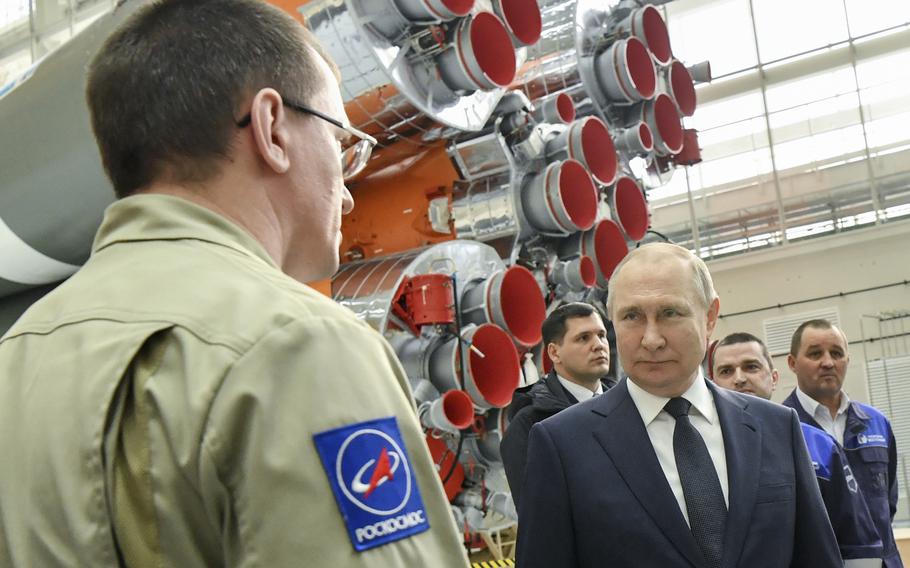
Russian President Vladimir Putin speaks with Roscosmos space agency employees at a rocket assembly factory during his visit to the Vostochny cosmodrome outside the city of Tsiolkovsky, about 200 kilometers (125 miles) from the city of Blagoveshchensk in the far eastern Amur region Tsiolkovsky , Russia, Tuesday, April 12, 2022. Russia on Tuesday marks the 61th anniversary of Gagarin’s pioneering mission on April 12 1961, the first human flight to orbit that opened the space era. (Evgeny Biyatov, Sputnik, Kremlin Pool Photo via AP)
Unless Vladimir Putin rapidly comes to his senses and pulls out of Ukraine, Russia is on the verge of being cast out of the international capital markets for a very long time. Any bondholders still invested in the nation’s debt are on their own.
The Russian government has tried to maintain payments to its creditors, but the U.S. Treasury’s Office of Foreign Assets Control is inexorably and expertly tightening the noose to halt those money flows. All the avenues and back-channels for Russian government-related entities to keep servicing their debts are being shut down. The credit-rating agencies and benchmark bond-index providers are dropping Russia bonds from their businesses. A formal default by the government is likely to be triggered in the next few weeks.
Russia has in effect acknowledged its pariah status by threatening legal action, and saying it will halt bond sales for the rest of the year. Quite who or what it could successfully sue is unclear, and the prospect of new Russian debt had already evaporated when it invaded Ukraine on Feb. 24. As Russian Finance Minister Anton Siluanov commented in Russian newspaper Izvestia, the borrowing costs on any bond sale would be “cosmic.” It’ll be many years before we see the country tap the market for dollars, euros or other international currencies, but Russia is also stopping issuance domestically in rubles.
That’s not so much of a problem while Europe is still paying $1 billion a day for Russian energy. If sanctions on coal are followed by bans on oil and gas, however, those cashflows would end and its inability to borrow would start to hurt. “Russia will be in default for perhaps a decade,” says Tim Ash, an emerging-markets strategist at Bluebay Asset Management. “That means no access to international capital markets, very high costs of borrowing even from the Chinese, no investment, no growth, low living standards. It’s a terrible outlook for Russia and Russians.”
The latest shoe to drop is in the credit default swap market, with the International Swap Dealers Association’s determinations committee ruling that state-owned Russia Railways is in payment default. The CDS market is where protection against a debt issuer’s failure to pay is bought and sold; now that the precedent has been set, the sovereign itself and other Russian entities will surely soon suffer the same fate.
The ISDA ruling triggers a process to determine how the big investment banks and fund managers compromise on settling the swaps, which would typically be conducted via an auction of available acceptable securities. But as it will be nigh on impossible to deliver any of the underlying debt obligations because no western bank can process the transactions, a simple cash payout on the CDS contracts looks likely. What percentage bondholders are compensated for has yet to be resolved, though it’s likely to be close to the full amount insured. What is important for the finance industry, which has lived through several credit derivatives disputes, is that the system appears to be working as intended this time.
Russian borrowers, though, face a substantially worse outcome than during the previous Russian debt crisis in 1998, where only ruble-denominated payments were missed while foreign currency creditors remained whole, and the rest of the world rallied round to pick it the country off its knees economically in the following years. This time, Russia is firmly on its own, facing a financial crisis of its own making and with only itself to blame.
This column does not necessarily reflect the opinion of the editorial board or Bloomberg LP and its owners. Marcus Ashworth is a Bloomberg Opinion columnist covering European markets.